It’s a Tuesday afternoon in Manhattan, and Andrew Yang is lounging at an outdoor coffee shop a stone’s throw from Times Square. Pedestrians bustle by, until one pauses and double-takes.
“Mr. Yang! Do you remember me?” the onlooker shouts. Yang smiles as the man explains how he was at one of Yang’s 2021 mayoral campaign events. “Are you running for something?” the man asks. Yang offers a well-rehearsed line: “Right now, I’m trying to help some good people win around the country.”
As we talk on the cramped curbside patio, Yang poses as one who, if not running for office himself, sure seems like it. He’s recently released a book, “Forward,” diagnosing America’s problems, and he’s launched what he calls a new political party, the “Forward Party,” in an attempt to address the problems plaguing the country.
Yang’s efforts have caught the attention of some notable thinkers, from social psychologist Jonathan Haidt to New York Times columnist Kara Swisher. Yang — dressed in a crisp, dark blazer with his new party’s logo pinned to the lapel — pauses frequently for various shoutouts and requests for selfies from passersby. He doesn’t seem to mind the interruptions, and as each one leaves, he seamlessly returns to reciting memorized statistics about how America is as polarized as it’s been since the Civil War: 42% of Republicans and Democrats view the other side as a threat to the country. … 62% of Americans want to move away from the two-party duopoly. …
“Democracy,” he says, “is hanging by a thread.” But he has a plan, and the onetime presidential candidate is quick to explain it. He wants to rebuild trust in elections by revamping the country’s electoral system. He envisions a “human-centered economy” that values his stay-at-home wife as much as it values a full-time laborer. He wants to cut the incentives that keep ineffective politicians in office year after year. And he foresees a streamlined tax system that, in turn, helps fund his ambitious spending plan.
It’s been six months since Yang dropped out of New York City’s mayoral race, and over two years since he ditched his bid for the 2020 Democratic presidential nomination. Now, absent any ticket, Yang says he’s liberated from partisan labels and empowered to pursue his vision for the country unfettered — but as we converse, it’s hard not to sense that this is a man who misses a political stage from which to promote his ideas. Andrew Yang has a vision to save America. But his biggest challenge may be figuring out how to get Americans to listen.

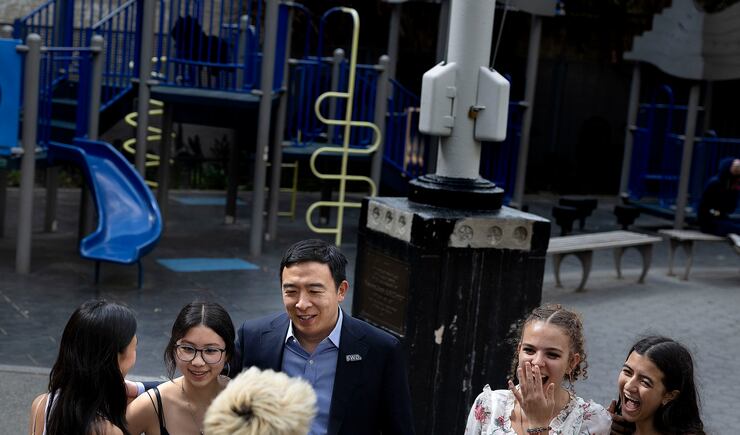
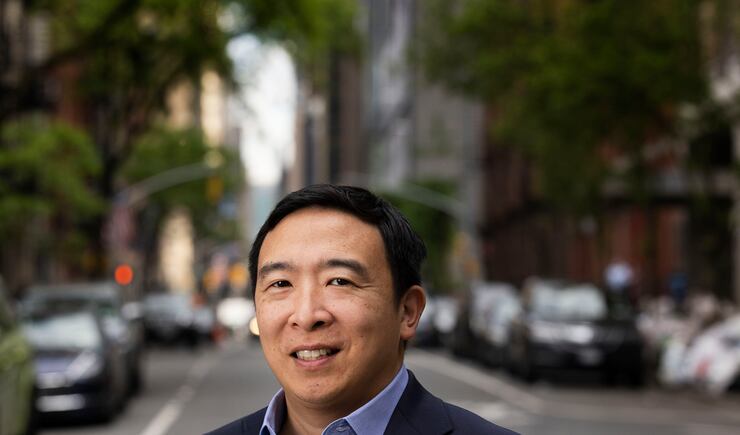
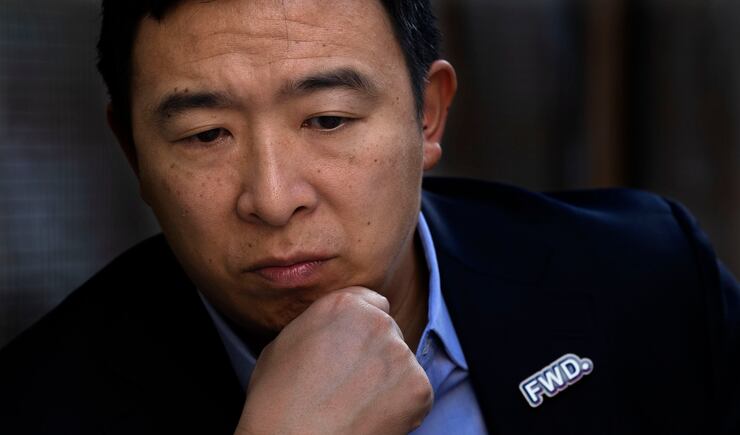
Yang used to be a Democrat, before publicly breaking up with his party last October and rebranding as an independent with his own bespoke political party. “Now that I’m not a member of one party or another, I feel like I can be even more honest about both the system and the people in it,” he wrote in his public Dear John letter.
Yang’s cross-partisan flirtation is central to his vision for fixing the country, but it’s not without controversy. To the transgressive conservative podcaster Joe Rogan, Yang was first a listener, then a podcast guest, and then a defender, tweeting (and then deleting) that Rogan was not a racist after recordings of Rogan using the n-word surfaced. Yang has run to the defense of controversial comedian Dave Chappelle, too, calling him a “great guy.” Chapelle, in turn, endorsed Yang in 2020 and did a campaign event for him in Iowa.
During our conversation, Yang chose to focus on the shortcomings of the two-party system. “One of the things that I think is keeping us stuck in the mud is that you do have this two-party system, where compromise is anathema to really both parties,” Yang told me. “And if that changes, then you could see a lot more problem-solving and productivity out of Washington.”
Among those solutions he’d like to see is a universal basic income plan, or UBI — a $1,000 monthly check for every American. Yang popularized the notion during his presidential campaign and refurbished a version of it in New York. In an era of rising inflation, few politicians are touting UBI, but Yang is looking long term at building what he calls a “human-centered economy” in an age of automation and artificial intelligence.
UBI, he insists, is not socialism, as some critics claim. Rather, he says, it’s about “humane capitalism,” focused on giving individuals more access to free markets. Yang takes partial credit for the COVID-19-era stimulus payments, saying that trumpeting UBI on the campaign trail helped soften Americans to the idea of mass government payments.
But many of Yang’s ideas to reform America seem to draw from the same well: How to save local journalism? Give every American a $250 refundable tax credit to spend on a subscription to their local paper. How to end big-money donors’ and special interests’ sway in Washington? Give every American $100 annually to donate to the candidate or cause of their choice. How to fight misinformation on social media? Give everyone a check to pay for an ad-free version.
When viewed through Yang’s comfort with government spending, few traditional conservatives would likely give Yang the time of day. But he doesn’t see himself as a money-bleeding socialist — rather, as a radical marketist. He wants capitalism to work, and, to him, that means making markets inclusive and more oriented toward measures of quality of life.
“A human-centered economy would revolve around positive outcomes,” he says, “like our health, our mental health, our children’s success,” and not just GDP or stock growth.
“The two parties are content to play, ‘you lose, I lose,’ while we’re all the ones on the outside looking in.” — Andrew Yang
When he talks about his human-centered policy vision, he actually starts to sound like a social conservative (which might explain why he felt the need to start his own party). Yang values his wife’s work — staying at home and raising their two sons, one of whom is autistic — as no less important than his as the household’s primary breadwinner.
“My wife and other stay-at-home parents get valued at essentially zero (in our economy),” he says, “which is one of the reasons why we’re losing the thread in American life.” 40 percent of American children are now born to unmarried mothers, he says, which makes positive outcomes for the children statistically less likely.
What about gun violence? The solution, in addition to “common sense” reforms, is in the home, Yang says — a controversial position these days, especially for a former Democratic presidential hopeful. But Yang, per usual, has statistics at the ready: 95% of mass shooters in the U.S. are boys and men. “We have a problem forming strong, healthy young men in this country,” Yang tells me. “Anything we can do to invest in positive outcomes for boys and men we should be doing, and that would start with trying to keep families together.”
That’s where his economic proposals come in. “If we start solving problems and make it so that people are making good livings, they’d be more likely to feel like they can have children,” he says. “As a parent myself, I think that should be something we aspire to as a society.”
Andrew Yang is an unusual “politician,” which is part of his niche appeal. “We need to do the opposite of much of what we’re doing right now,” Yang famously said during his 2020 campaign, “and the opposite of Donald Trump is an Asian man who likes math.”
That line launched Yang’s brand. Instead of red MAGA hats, his “Yang Gang’’ started selling blue ball caps with “MATH” emblazoned across them: Make America Think Harder. Yang wanted an ideas-driven campaign, constructed around his policy cornerstone of UBI (which he calls a “freedom dividend,” because it polls better among conservatives). The idea became synonymous with Yang’s persona.
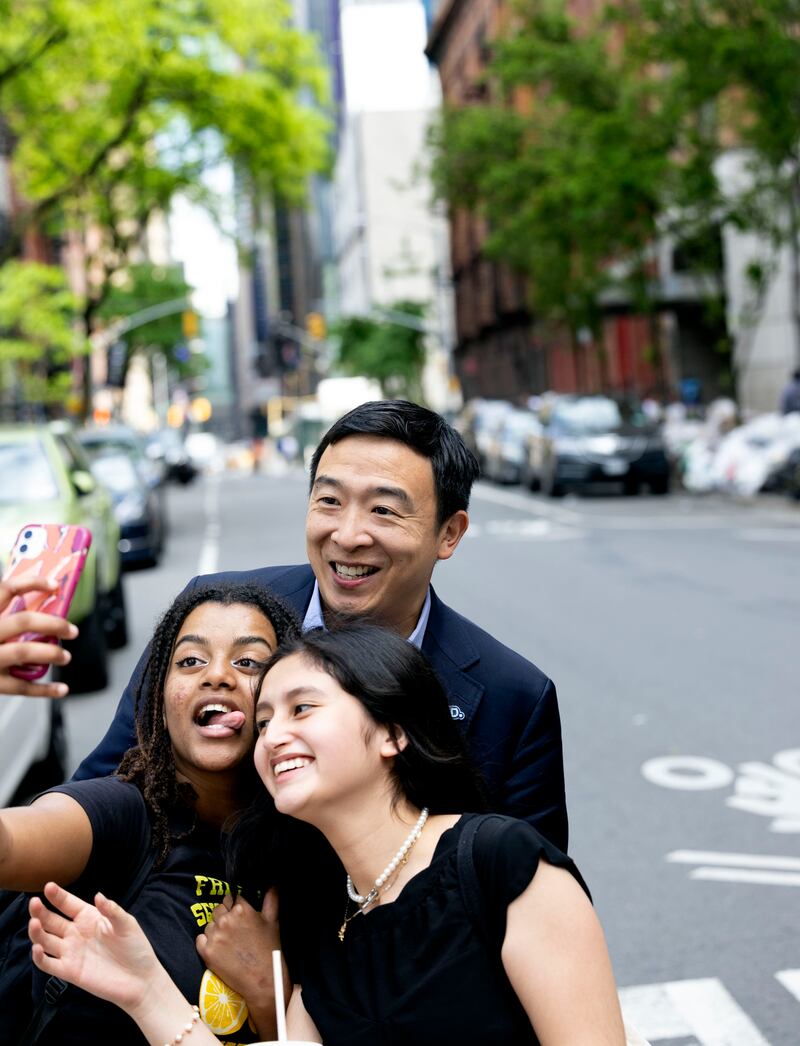
But as much as Yang tried to center his campaign around policies, he quickly learned that most Americans — and the news outlets they follow — seem less interested in wonky white papers. “The media would not cover ideas so much as characters,” Yang writes in his newest book, and that realization sparked a shift in the campaign’s approach. “It turns out everyone, including the press, craved a human being having fun on the trail.”
If “MATH” was Yang’s official slogan, “fun” became his mantra. When a fundraising event went long and there was no time to greet each supporter, he made the most of it by crowd surfing in a suit. When another event fell through, he stalked out a Jazzercise class and did the Cupid Shuffle, also in a suit.
His mayoral campaign marched to the same drum. He wanted to help the city return to normal life after the pandemic. “I just want New York City to work again,” Yang told The New York Times. “And in order for New York City to work, people need to feel safe having fun.”
The message was refreshing. Yang bolted to the top of the polls shortly after entering the race, using some mix of name recognition and pandemic fatigue to his benefit. Annie Lowrey, a staff writer for The Atlantic, followed Yang around New York City for several days, “He’s just really sunny and friendly and happy, and slightly seems half-surprised to be there too,” she said. “And I think people like that.”
When a man attacked a photographer during a campaign trip to Staten Island, Lowrey noted how Yang ran to help. The assailant swung around to see New York’s newest political celebrity. “Yang for New York!” he said, starstruck. “You are the man! Would you like me to support you?” The victim escaped safely, apparently thanks to the mere presence of Yang.
But when the city started to reopen during the summer of 2021 on its own — coupled with a sharp uptick in violent crime — the tide began to turn against the Yang Gang, and in favor of seasoned NYPD captain Eric Adams. Yang faced accusations that he wasn’t a “real New Yorker.” His favorite subway station, he said, is Times Square (only tourists say that!), and he referred to an upscale market as a “bodega” (a real New Yorker can easily differentiate!).
Yang didn’t win, but he stayed relevant. As we talked, a high-school-aged girl ran up to get a selfie with Yang. She knew him by name. “You’re, like, running for mayor or something, right?” she asked.
Yang smiled, faintly. “No, I lost that one already. Sorry.”
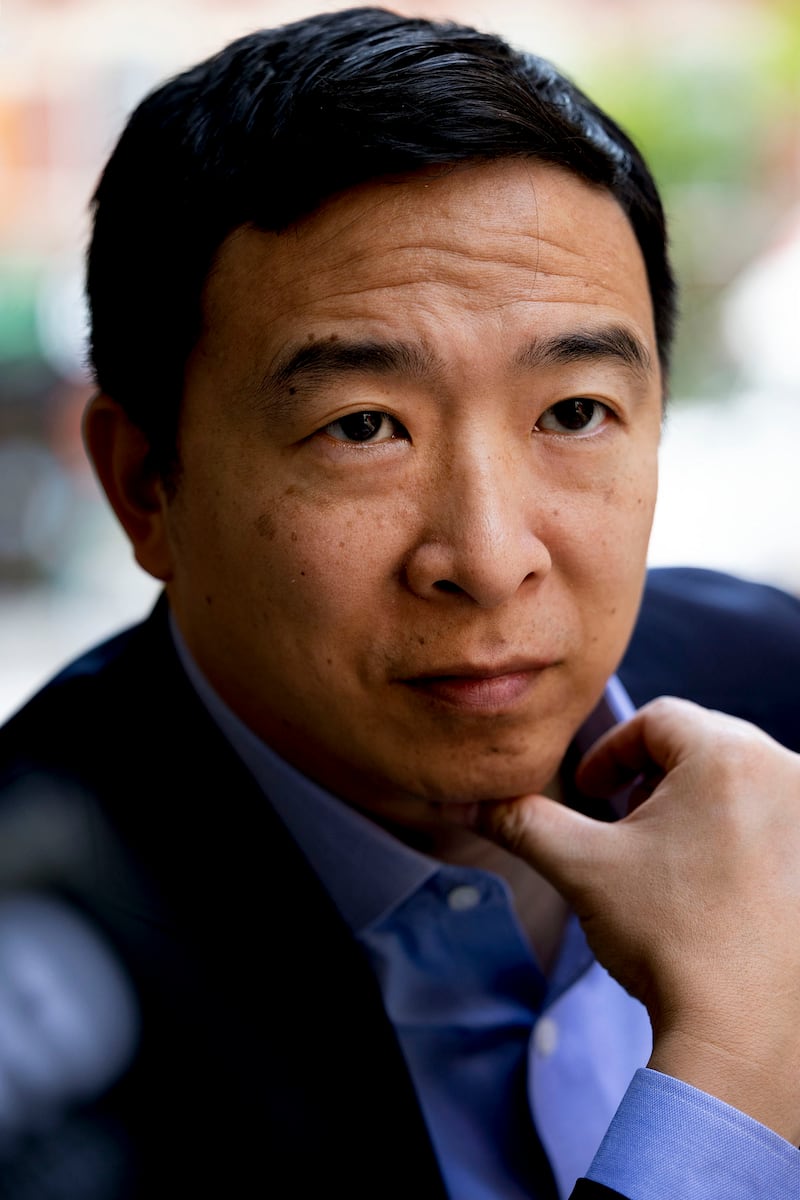
The night before our interview, Yang spoke at the Columbia Law School commencement ceremony. “I’m told that one of the reasons I’m here tonight is due to student voting. So thank you for that,” Yang, a Columbia law alumnus, told the graduates.
“It’s the first election I’ve ever won.”
The audience laughed. Behind Yang’s self-deprecation is the reality that Yang’s political exploits have flopped — twice. But Yang, who left a brief legal career to become a serial entrepreneur, isn’t easily deterred. Democracy is in danger, he warns, and his Forward Party movement wants to save it.
Yang’s more ambitious ideas — and the ones, in his mind, that correlate directly with the health of our democracy — are admittedly the toughest to tackle. How do we implement term limits in Congress, when the very people who would pass such limits are the ones the limits would affect? The way forward has to come from outside the two-party duopoly, he says. “The two parties are content to play, ‘you lose, I lose,’ while we’re all the ones on the outside looking in,” That’s why, he says, some 50% of Americans self-identify as independents.
Yang already has heavyweights in his corner. “Ten years ago, I would have said that’s hopeless, but now I think perhaps the time has come (for a third party),” acclaimed social psychologist Jonathan Haidt told the Deseret News.
Ask Yang if his movement is working, and there’s no doubt: yes. He points to the campaigns he’s supporting around the country, including Utahn Evan McMullin’s run for the U.S. Senate as an independent. McMullin isn’t formally associated with the Forward Party, but Yang has publicly supported him.
I ask how long it will be before we have an independent in the White House, and Yang can’t say, but he thinks it’s sooner than most believe is possible. “If it winds up being Trump versus Biden in ’24, a poll just came out that said 58% of Americans would want an alternative,” he says.
Does that mean he will run? Yang is coy in his response, but he doesn’t say no. It’s more likely, he says, that he’d throw his support behind a third candidate.
But when I press, he admits that anything is on the table. “I’m always willing to consider something I think is going to be good for the country, you know? So I wouldn’t rule anything out.”





